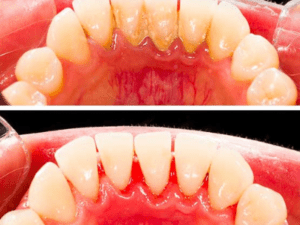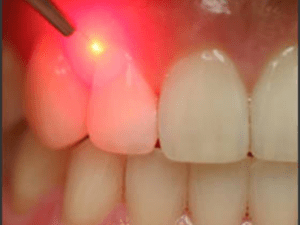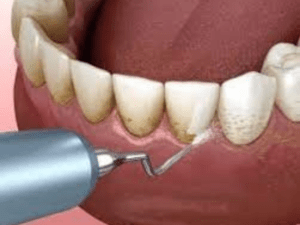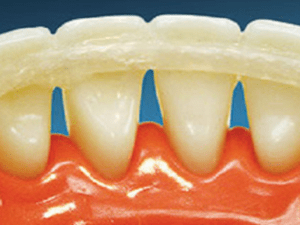Gum Treatment
Also known as scaling and root planing or a deep cleaning, gum therapy treats the area beneath the gumline when signs of gum disease are present. According to the American Dental Association, gum disease commonly affects patients who don’t do a good enough job eliminating plaque from their teeth.
Treatments given for gum diseases are:
Complete mouth scaling and polishing
Scaling and polishing removes deposits such as plaque and calculus (tartar) from tooth surfaces. Over time, the regular removal of these deposits may reduce gingivitis (a mild form of gum disease) and prevent progression to periodontitis (severe gum disease).

Treatment for the bad breath
To reduce bad breath, help avoid cavities and lower your risk of gum disease, consistently practice good oral hygiene. Further treatment for bad breath can vary, depending on the cause. If your bad breath is thought to be caused by an underlying health condition, your dentist will likely refer you to your primary care provider.

Gum Surgery
Gum diseases such as gingivitis and periodontitis may require surgical treatment. Gingivitis is a mild form of gum disease that can cause gum redness, swelling, and bleeding. Periodontitis is a more severe form of gum disease in which gingivitis has worsened and advanced, leading to an inflammatory response that destroys bone and tissues.

Deep Cleaning
Deep cleaning is different from a regular dental cleaning. This type of procedure goes below the gum line. It does this to clean hard-to-reach spots like the roots and pockets at the base of your tooth. A substance known as tartar can build-up around the exterior and roots of teeth. If left unchecked, then this tartar can cause serious bacterial infections.

Mobile teeth solution with splinting
Splinting is a procedure where the teeth are supported in its position for a period of time. This is done to teeth that are traumatized or teeth whose supporting structures are affected by disease, which prevents them from supporting the teeth.

In healthy gums neck of teeth is firmly attached but due to improper cleaning plaque may start settling between the gums and teeth that result in irritation of gum margins which produces a condition called gingivitis. Gingivitis can be seen as redness, bleeding and swelling of the gums. If left untreated it can lead to the destruction of tooth-supporting tissues known as Periodontitis. At this stage, teeth become mobile which leads to an inability to withstand masticatory forces. Formation of pus and bad smell can also occur in the majority of cases.